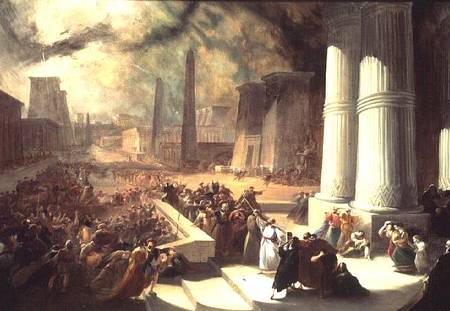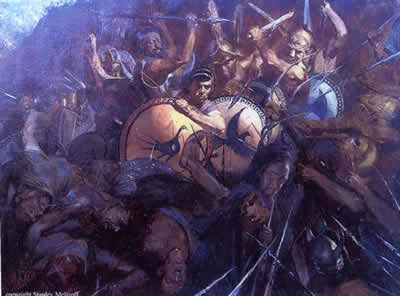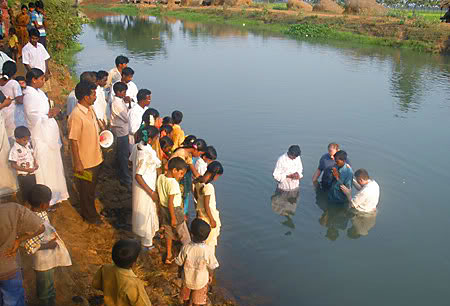Jan
24
2012

“Rivers of water run down from my eyes,
because men do not keep Your law.” Psalm 119:136
I might bag out [1] the Biblical Horizons crowd for their views on baptism, but otherwise they are giants. They have a hold on Scripture and history that enables them to understand the times.
Rich Blesdsoe recently made the observation that the unbelief which constantly confronts us Western Christians is quite a different animal to the demonism found in other cultures. We don’t suffer the full-scale “possessions” seen in pagan cultures. The rebellion is just as self-destructive, as crazed and zealous, and just as much a “nothing” as the idols of the pagans, but it is a different kind of nothing. What’s going on in our culture?
[This post has been refined and included in Sweet Counsel: Essays to Brighten the Eyes.]
Continue reading
Comments Off | tags: Demons, Ecclesiology, Edwin Friedman, Islam, Postmillennialism, Reformers, Rich Bledsoe | posted in Biblical Theology, The Last Days, The Restoration Era
Jan
20
2012
or Paedobaptism vs. Postmillennialism

The word regeneration is often used to describe conversion, but in Scripture it is understood as a process. God calls, cleanses, instructs, clothes, feeds and commissions us. I believe this fact is, however, abused by paedobaptists, who seem to me to be prone to throw the actual “watershed” of conversion out with their baby bath water.
Continue reading
10 comments | tags: Baptism, Calvin, Federal Vision, Postmillennialism | posted in Bible Matrix, Biblical Theology
Nov
18
2011

In Deep Comedy, Peter Leithart compares the Bible’s essentially comic and hopeful view of history with the Greco-Roman view, which is essentially and irredeemably tragic.
In Paul’s estimation, anyone who thought that the new life through Jesus pertained to some realm outside this history was simply an unbeliever. For the gospel says otherwise.
Continue reading
1 comment | tags: Church Fathers, Church History, David, Ecclesiastes, Faith, Gnosticism, Job, Literary Structure, Peter Leithart, Postmillennialism, Solomon | posted in Against Hyperpreterism, Biblical Theology, Quotes
Nov
7
2011
or A Dream Within the Dream

One of the hyperpreterist/full preterist [1] gents made a keen observation after reading my article Covenant is the Key: Moses vs. Hyperpreterism. My argument was that since the Revelation follows the Covenant structure laid down in the Torah (and echoed throughout the Bible), we should expect the final section of the book to concern the future, otherwise known as Continuity or Succession.
The counterargument was that this section did concern the future when John wrote the book, but that we are living beyond that future now, and there is no final event or consummation. The only consummation was AD70.
This is a really good argument, but it does two things. Firstly, it makes nonsense of their own argument that Revelation 20 is another viewpoint of the events surrounding the end of Judaism in AD70. Also, it fails to take into account the structure and contents of Revelation 20 itself.
Continue reading
3 comments | tags: Against Hyperpreterism, Covenant Theology, Feasts, Literary Structure, Millennium, Postmillennialism, Revelation, Revelation 20 | posted in Against Hyperpreterism, Bible Matrix, Biblical Theology, Ethics, The Last Days, The Restoration Era
Nov
6
2011

Part of the process of maturity for the Spirit-led Church is to go where no institution has gone before. The Jews crossed Land and Sea to make proselytes, their Temple a spring in the desert, but Christian mission was the over-tipping of the cleansing Laver, the baptism of the first century world. Of course, this was bound to have political consequences.
Continue reading
Comments Off | tags: Church History, Constantine, Ecclesiology, Peter Leithart, Postmillennialism | posted in Apologetics, Quotes
Oct
24
2011

“He comes to make His blessings flow, far as the curse is found…”
And [Moses] said, (T) (Creation)
…..“If you diligently heed the voice of the LORD your God (H) (Division)
……….and do what is right in His sight, (Ascension)
……………give ear to His commandments (E) (Testing)
……….and keep all His statutes, (Maturity)
…..I will put none of the diseases on you (O) (Conquest – Blessing)
…..which I have brought on the Egyptians. (Conquest – Cursing)
For I [am] the LORD who heals you.” (S) (Glorification)
— Exodus 15:26
“QuantumGreg” posted a comment on Sam Frost’s review of my book. He objects to the idea that, under the New Covenant, obedience to the Law will bring a decrease in disease. It’s a very reasonable objection.
“…does this not sound like Law to you? In fact, it is the Law (Deuteronomy 28). It sounds so much like the Old Covenant that it has no resemblance to the New Covenant, don’t you think?
Continue reading
10 comments | tags: Covenant curse, Covenant Theology, Exodus, James Jordan, Postmillennialism | posted in Biblical Theology, Christian Life, Quotes
Oct
18
2011

If there is a God, and there is, then atheism did not free our thinking. Atheism has a closed mind concerning anything beyond its own nose. Thus, rather than furthering the cause of science, it is more likely that it has a stranglehold on it.
The gifted minds of the new atheists were gifts from Christianity. As the Spirit of God vacates Western Culture, so does the “Word.” Our children become confused, illiterate, and incapable of logical thought. According to Bojidar Marinov, we are already seeing atheism’s effects in the field of mathematics.
Continue reading
Comments Off | tags: Atheism, Bojidar Marinov, Education, Postmillennialism | posted in Biblical Theology, Creation, Quotes
Sep
22
2011

or The False Bride Will Never Get A Management Position
“…the only unity that will be allowed by the Father is the unity that Jesus requested from the Father in John 17.”
One of the interesting “universal themes” that James Jordan has uncovered in the Bible is that of Satan’s various attempts to “gather the nations” against the Church. You can read about that in a series of blog posts called Amalek Debunks Hyperpreterism (click here and scroll down).
Continue reading
4 comments | tags: AD70, Babel, Economics, Herod, James Jordan, New Jerusalem, Postmillennialism | posted in Biblical Theology, The Last Days
Aug
4
2011

“Courage is the flower of conviction.”
When Christians speak of “cultural engagement,” what comes to mind? Are we thinking diamond rings or swords and strategies?
Jefferey Ventrella again:
Postmillennialism provides a biblically tenable basis for hope in God’s future grace. But we must not forget that God’s decree ordains both the end as well as the means. Christians must “work out their own salvation,” and this means ethical living by God’s holy standard, that is, theonomic living…
Continue reading
Comments Off | tags: Culture, Jeffery Ventrella, Postmillennialism | posted in Biblical Theology, Christian Life, Quotes
Aug
2
2011

Jeffery Ventrella writes:
If theonomic postmillennialism is true—and it certainly is—then what differences here and now should this conviction make in the lives of Christians and their churches? What should be the character, and what should be the conduct of a professing postmillennialist?
Continue reading
Comments Off | tags: Dominion Theology, Evangelism, Jeffery Ventrella, Postmillennialism | posted in Christian Life, Quotes



































